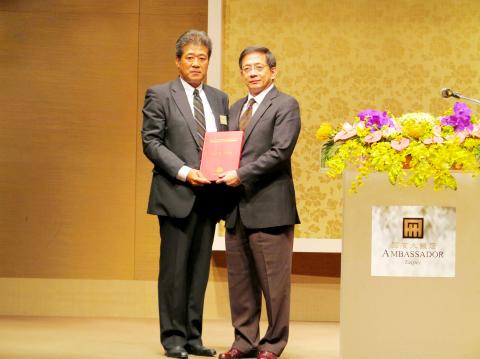Taiwanese electronics companies should benefit from a weaker yen, as many of them import key components from Japan, an executive from the Japanese Chamber of Commerce and Industry in Taipei said yesterday.
The Japanese currency dropped near a seven-year low of ¥114.5 per US dollar yesterday after the Bank of Japan unexpectedly said on Friday last week that it was expanding its monetary easing policy to combat deflation.
“The yen may pull back a bit after the dramatic depreciation, but I believe the currency will remain weak in the long term,” Isao Takeuchi, a senior director of the business association, told a media briefing.

Photo: CNA
Takeuchi is also the general manager of Mizuho Bank Ltd’s Taipei branch.
Japanese manufacturers with operations in Taiwan might not benefit much because they have diverse production bases at home and abroad, Takeuchi said.
However, for Taiwan, it will be a different story, he said.
“As most Taiwanese electronics companies, especially those in the information technology industry, purchase key components from Japan, the yen’s significant decline will help them reduce component sourcing costs,” Takeuchi said.
Taiwan’s LCD and semiconductor industries are two of the biggest importers of chemical materials and equipment from Japan, data from the Industrial Development Bureau show.
In addition, Taiwanese foundry and DRAM firms, as well as suppliers of components used in machine tools and bicycles, might indirectly get a boost in orders from their Japanese clients as the weaker yen makes Japanese brands more price competitive, the bureau said.
However, the yen’s depreciation might negatively impact certain Taiwanese firms, the bureau said.
Bicycle and machinery tool manufacturers could bear the brunt of stronger pricing competition from their Japanese counterparts, it said.
The Japanese business association, which represents 450 Japanese firms in Taiwan, also delivered an annual white paper to the National Development Council.
The government should accelerate negotiations with Japan to ink an economic partnership agreement — which is similar to a free-trade pact — to deepen trade ties between the countries, the white paper said.
It also urged Taiwan to reduce its economic reliance on China and to explore new business opportunities outside the world’s No. 2 economy, such as emerging countries in Southeast Asia, chamber chairman Hiroshi Ishizuka said.

SEMICONDUCTORS: The German laser and plasma generator company will expand its local services as its specialized offerings support Taiwan’s semiconductor industries Trumpf SE + Co KG, a global leader in supplying laser technology and plasma generators used in chip production, is expanding its investments in Taiwan in an effort to deeply integrate into the global semiconductor supply chain in the pursuit of growth. The company, headquartered in Ditzingen, Germany, has invested significantly in a newly inaugurated regional technical center for plasma generators in Taoyuan, its latest expansion in Taiwan after being engaged in various industries for more than 25 years. The center, the first of its kind Trumpf built outside Germany, aims to serve customers from Taiwan, Japan, Southeast Asia and South Korea,

Gasoline and diesel prices at domestic fuel stations are to fall NT$0.2 per liter this week, down for a second consecutive week, CPC Corp, Taiwan (台灣中油) and Formosa Petrochemical Corp (台塑石化) announced yesterday. Effective today, gasoline prices at CPC and Formosa stations are to drop to NT$26.4, NT$27.9 and NT$29.9 per liter for 92, 95 and 98-octane unleaded gasoline respectively, the companies said in separate statements. The price of premium diesel is to fall to NT$24.8 per liter at CPC stations and NT$24.6 at Formosa pumps, they said. The price adjustments came even as international crude oil prices rose last week, as traders

SIZE MATTERS: TSMC started phasing out 8-inch wafer production last year, while Samsung is more aggressively retiring 8-inch capacity, TrendForce said Chipmakers are expected to raise prices of 8-inch wafers by up to 20 percent this year on concern over supply constraints as major contract chipmakers Taiwan Semiconductor Manufacturing Co (TSMC, 台積電) and Samsung Electronics Co gradually retire less advanced wafer capacity, TrendForce Corp (集邦科技) said yesterday. It is the first significant across-the-board price hike since a global semiconductor correction in 2023, the Taipei-based market researcher said in a report. Global 8-inch wafer capacity slid 0.3 percent year-on-year last year, although 8-inch wafer prices still hovered at relatively stable levels throughout the year, TrendForce said. The downward trend is expected to continue this year,

Taiwan Semiconductor Manufacturing Co (TSMC, 台積電), which supplies advanced chips to Nvidia Corp and Apple Inc, yesterday reported NT$1.046 trillion (US$33.1 billion) in revenue for last quarter, driven by constantly strong demand for artificial intelligence (AI) chips, falling in the upper end of its forecast. Based on TSMC’s financial guidance, revenue would expand about 22 percent sequentially to the range from US$32.2 billion to US$33.4 billion during the final quarter of 2024, it told investors in October last year. Last year in total, revenue jumped 31.61 percent to NT$3.81 trillion, compared with NT$2.89 trillion generated in the year before, according to